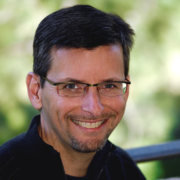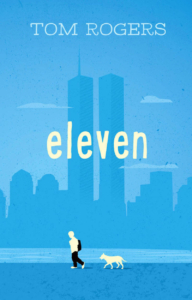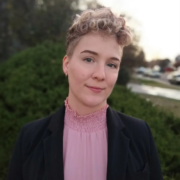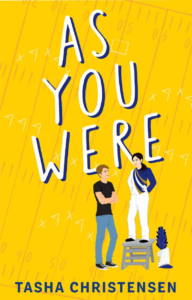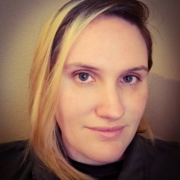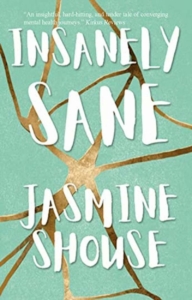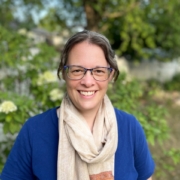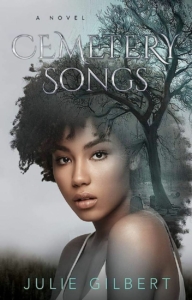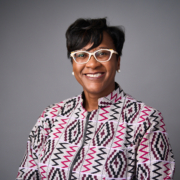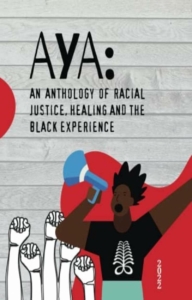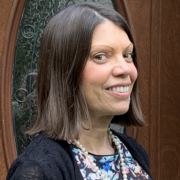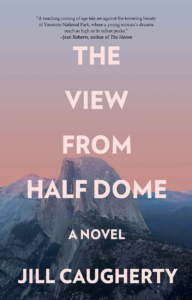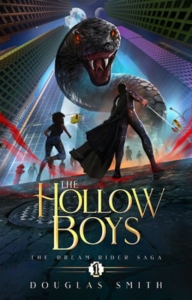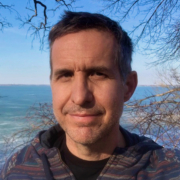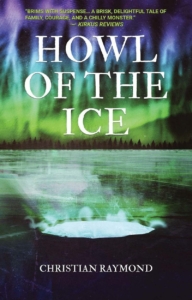2023 Alberta Author Project Winner
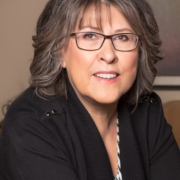
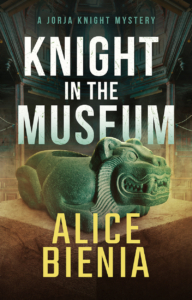
Alice Bienia
Knight In The Museum
Calgary Public Library
Tell us a little bit about yourself.
I am a Canadian crime writer and three-time Crime Writers of Canada Awards of Excellence finalist, best known for my Jorja Knight mystery series. I love reading and writing page-turning mysteries that combine tight plots, realistic characters, and surprising twists to create edge-of-your-seat whodunits. In addition to my Jorja Knight mystery series, my short stories are published in The Dame Was Trouble, Crime Wave, and Last Shot anthologies. I’m a member of Crime Writers of Canada, Sisters in Crime, and the Writers’ Guild of Alberta.
In my former life, I worked as a geologist and management consultant. After riding the energy industry rollercoaster for thirty years, I have finally found a way to put my inherent introversion to use and now write full time. When not plotting a murder, I love watching foreign flicks, reading, and exploring Calgary’s urban parks and pathways.
Tell us a little bit about your winning book.
Knight In Peril is the sixth book in my Jorja Knight mystery series, but it can also be read as a standalone. My protagonist, Jorja Knight, is what I like to call, an everyday hero. She’s an ordinary woman trying to make her way in life. A former forensic lab analyst, her world was turned upside down when a brutal attack by a fellow employee on a killing spree left her wounded and re-evaluating her life. Now a private detective, she’s utilizing her personal and analytical skills to help make a positive difference in other people’s lives.
After several challenging cases, PI Jorja Knight is ready to meet up with her long-time best friend, Gabriella Rizzo, for a much-needed vacation. But when Jorja arrives in the ancient, mysterious city of Istanbul, she knows something is wrong. Her best friend isn’t at the airport to meet her as promised. Gab’s suitcases are at the guest house—but she’s vanished. She’s not answering her phone, and no one has heard from her in days.
Alone in a city of fourteen million people, Jorja faces her worst fear—her best friend has been abducted. Jorja’s desperate race to find Gab plunges her into a dangerous world of lies, secrets, and greed, where witnesses take bribes, suspects won’t talk, and corrupt politicians barter for favors. With time running out to save her best friend, Jorja must navigate the murky depths of Istanbul’s dark underbelly, where every move could be her last.
What made you want to be an author?
I’ve been an avid reader all my life but when I was growing up it never even occurred to me that I could write for a living – people in my world, where I lived – didn’t grow up to be writers.
My parents, like most other recently arrived immigrants, stressed the importance of going to school, studying, and getting an education that would help us to find stable, well-paying jobs. The idea that one could make a living as a writer was a foreign concept – and maybe still is (LOL).
So, I, like many others, took a rather unconventional route to becoming an author. I went to university and obtained a Bachelor of Science degree in Geology and spent my early career years conducting field exploration programs in remote regions of Canada, where I honed my passion for reading, storytelling, coffee, and adventure.
Writing always played a vital role in my career as there were reports to write, courses to build, and papers to research and present. But somewhere along the way, the idea of becoming a fiction writer began to percolate in my brain. Over time the idea moved to the front of my thinking and took firm hold. I enrolled in a few writing classes and started to explore the in and outs of the publishing industry. The urge to write grew stronger and stronger and in 2014 I decided to turn my attention to writing full time. Like they say, there was no going back; my writing life is more fulfilling than I ever imagined.
How have libraries played a role in your indie author journey?
Libraries were a godsend for me growing up. They offered me a window into a world that I could barely imagine. Although books were a luxury we couldn’t afford –thankfully, library cards were free. I would take out the maximum number of books allowed at one time and return them well before their due date for another batch.
Over time, libraries became the place I took my children. Later still, they became the place where I attended talks, readings, and book launches by other authors. They offered up the idea that this was possible for me too.
Now that I’m writing and publishing my own books as an indie author, libraries are helping me to get my books out there by putting them into more peoples hands. Maybe even people who like my former self, rely on libraries to open up windows into worlds that they can barely imagine and the opportunities that lie there.
Do you have any advice for aspiring indie authors?
Drafting a whole novel can seem daunting. And it does take a lot of work. Start with a few words on a page, and then add a few more. Keep going. Write something every day. Keep adding words. Keep learning. Slowly and steadily, you’ll get better, the writing will come easier. Persistence will get you to the finish line.
Don’t worry about what people will think, whether they will like what you’ve written, or what you will need to do to get it into their hands. Keep writing. Write for the joy, excitement, and fulfillment it gives you. Enjoy the process. Don’t give up. You’ll be amazed at what you can create if you just keep going!
Don’t worry about what people will think, whether they will like what you’ve written, or what you will need to do to get it into their hands. Keep writing. Write for the sheer joy, excitement, and fulfillment it gives you. Enjoy the process. Don’t give up. You’ll be amazed at what you can create if you just keep going!
2023 California Author Project Winners
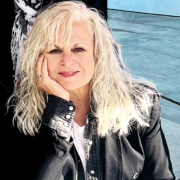
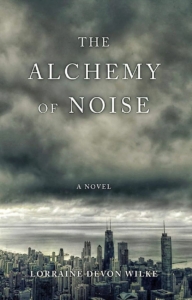
Lorraine Devon Wilke
The Alchemy of Noise
Los Angeles Public Library
Tell us a little bit about yourself.
As the third oldest of eleven children, a third daughter, one of six girls with five brothers, I learned early the skillset of family responsibility, child care, and how to iron my father’s business shirts! But given my parents’ deep and abiding love of books, music, theater, etc., I also developed a well-honed appreciation of the creative arts across all spectrums. I was singing and performing in school plays, church folk groups, college rock & roll bands, and road theater shows from grade school up through my twenties and a move to Los Angeles. From there I continued my eclectic journey through every art form that inspired me, right up till now, an era when writing novels was added to the mix to become, in more recent years, my primary creative focus… though if a good play comes up or a rock band calls, I’m still always ready to perform!
Married, with one married son, and one stepdaughter with two children of her own, our family is large and loving, sports and arts are a major feature, and travel an always favorite activity. I keep a camera and my computer close at all times, ready to chronicle our adventures or jot down a new thought at any turn… never know when a novel idea might pop up!
Tell us a little bit about your winning book.
I always want my words to matter, in whichever medium I am working. I want my songs, articles, screenplays, books, even my photography, to illuminate the life that I see and experience, the “humanness” we all share, and that played a big role in this book.
With THE ALCHEMY OF NOISE, I decided to take on the ongoing social injustice of racial discrimination. I’d written many essays and op-ed pieces on the topic, and felt ready to put some of what I’d learned through research, interviews, interactions, and observations into a fully-realized novel, one that tackled the subject through the framing of a love story.
Given the subject matter of the book, and as a white author telling a story that involves strong portrayals of Black characters, I made a point of sharing some essential background in the author’s note to give context as to why I felt this specific story was mine to tell:
Earlier in my life I spent six years in an interracial relationship, and as educated as I thought I was on the topic of race and bias, as open-minded and racially progressive as my upbringing had been, it turns out I had only a glimpse of the bigger picture and so very much to learn. Witnessing, tangentially experiencing, and reacting to the “micro-aggressions,” recurring police harassment, and flat-out bigotry my partner dealt with on a day-to-day basis forever changed my worldview on the reality of race, white privilege, and systemic injustice.
It struck me that this experience offered not only the seeds of a topical and dramatic story, but brought into the conversation the specific, shared, and often disparate perspectives of a mixed-race couple. That seemed a unique and useful point-of-view to explore, particularly since lack of experiential empathy too often leaves participants in discussions of race struggling for true understanding.
From there I created a fictional set of characters, put them in contemporary Chicago (the city of my birth), plotted out their story arc, and gave them many of the challenges and obstacles I’d witnessed and experienced in my long-ago relationship… ones that, sadly, still resonate in current times. Adding perspective gleaned from the prodigious research and interviews mentioned above, THE ALCHEMY OF NOISE came to life with as much humanity, truth, and credibility as I could capture. At its heart it’s a love story, if one impacted by the provocation of race dynamics in our modern times. I hope readers find it both genuine and moving.
What made you want to be an author?
Being a reader… also having a wild imagination, an expressive mind, and a big mouth!
Somewhat uniquely, I spent my younger childhood years without a TV and, as a replacement, my father brought home boxes of books from the library, which I dove into like a glutton to good food. I read so relentlessly that my natural inclination was to see words and storytelling as a primary, essential, form of communication. I saw, felt, how they mirrored thoughts and experiences, inspired new ideas; told amazing stories, and certainly made this reader feel she wasn’t alone in the world. Books and writers held such a seminal place in my heart and mind, that there was never any doubt I would follow suit when it came time to express my own thoughts, ideas, and imagined narratives.
How have libraries played a role in your indie author journey?
Let me expand on the story touched on in the above question… it pertains!:
When I was a kid, the family TV set blew a tube, and, likely because we couldn’t afford a new one (that big family, remember?), my father announced, to our horror, that it would not be replaced. Instead (as mentioned above), he decided to regularly bring boxes of books home from the Chicago library, books we could cull through, read, and hold onto for up to three months at a time, after which they’d be replaced with new boxes. While we initially wailed in complaint, convinced missing Saturday morning cartoons would have staggering impact on our childhood development, the decision ended up being one of the most anticipated, appreciated, and meaningful things he ever did for us.
I so viscerally remember the excitement when he’d pull in the driveway after a visit to the library. We’d hover around him as he brought the boxes in, eager to go through each one, pulling out books we were most interested in, sometimes arguing over who got which book first, but ultimately each settling down with our tidy, individual collections. It felt like treasure to me. It was one of the most enriching experiences a child could have and I have no doubt this decision of my father’s had everything to do with my sustaining love of words and storytelling.
Since then, I’ve spent time in libraries as a student, a researcher, a mother with a little boy who wanted a library card, and certainly as a writer hoping to get my own books on those shelves. I will always see libraries as a creative church of ideas.. a place to find and explore as many of those ideas as a mind can imagine.
Do you have any advice for aspiring indie authors?
Yes, actually! As writers, particularly indie authors, we’re bombarded with boatloads of advice, rules, expectations, etc., all of which demand we conduct ourselves a certain way, create workflow a certain way; produce a certain number of books, apply a certain set of procedures, join a certain number of groups, and proceed with a certain amount of post-publication activity. I know writers who enthusiastically embrace all that, others who find those tasks overwhelming, still some who ultimately throw in the towel because the burden of not only producing exemplary writing, but carrying the marketing and promotional assignments, becomes too arduous. Which I understand completely.
So I want to say this to all that: There are no rules. Despite the fact that far too many insist upon and assert theirs, I believe rules are like religion: personal, non-transferrable, occasionally oppressive, and too often antithetical to the forward motion and the joy of DOING.
For example: There is no set number of books you should write in a year, no specific way or number of words you should accomplish in a day. You are not obligated to follow anyone else’s protocol. Yes, you can call yourself a “writer” even if you haven’t published anything yet (as long as you actually write), and certainly you can watch TV no matter what Stephen King says (in fact, I’ve gleaned serious inspiration from certain TV shows!). Bottom line: this is your journey. Do it your way. However you see fit. Be honest and professional about it, keep your standards high and your expectations realistic, and, most importantly, enjoy the ride.
Because what we create is all we have, all we can control. The rest is a crapshoot. Luck. Opportunity. Who you know. What you stumble upon. What doors open. So be sure to really enjoy what you create. Write to and for your own heart, mind, and soul’s desire. Tell the stories you want to tell, that you’d want to read. And make them as good, as meaningful, as page-turning as you’d expect to find… so you can be one of those writers you most admire.
2023 Colorado Author Project Winners
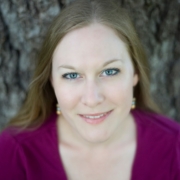
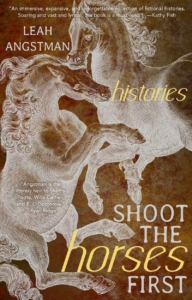
Leah Angstman
Shoot the Horses First
Louisville Public Library
Tell us a little bit about yourself.
I’m a transplanted Michigander now living in Boulder. I’m old-school Midwestern by nature (we Midwesterners were friendly once!), and I’m made up of equal parts Broadway musicals, French Revolution trivia, Colorado Avalanche and women’s ice hockey, 1930s Hollywood Canadian Mounties, nautical lore, German Shepherd fur, Bruce Springsteen, mountain hikes, chai lattés, a lineage of English teachers, punk rock, comic books, and American history lessons between 1636 and 1901 minus the Civil War. I read cholera death records and 1800s land deeds for fun, and I’m either not the person you bring to the party, or I’m exactly the person you bring. I have a dark, wry sense of humor, lots of obnoxious enthusiasm, and a penchant for exclamation points!, and most of my spare time is spent playing wing in the Denver Women’s Hockey League or ice skating early mornings at the local Y.
Professionally, I run Alternating Current Press, a Boulder-based indie publishing company that I founded in the 90s as a preteen, and I have also been an editor for Pacific Standard, Underscore News, Mother Jones, and Departures. My work can be found in Los Angeles Review of Books, Electric Literature, the Rumpus, Nashville Review, Publishers Weekly, and elsewhere. I’m the author of the novel OUT FRONT THE FOLLOWING SEA (Regal House, 2022), which won over 30 awards, including the Colorado Independent Publishers Association Evvy gold medal for historical fiction, CIPA Herb Tabak Choice Award for fiction, New England Society Book Award for fiction, and Tyler R. Tichelaar Award for best historical fiction; and was a finalist for numerous awards, including the Reading the West Book Awards for debut, IBPA Benjamin Franklin Awards for best new voice in fiction, and Mark Twain American Voice in Literature Award. I’m also the author of SHOOT THE HORSES FIRST (Kernpunkt, 2023), which was the Indie Author Project’s Colorado adult fiction winner and has won several gold medals, including the Shorts Award for Americana fiction, the Next Generation Indie Book Award gold for short stories, and the National Indie Excellence Awards Juror’s Choice Award and gold for short stories. My upcoming novel, FALCON IN THE DIVE (Regal House, 2024) has been a finalist for the Clue Book Award for historical suspense and the Goethe Book Award.
Tell us a little bit about your winning book.
SHOOT THE HORSES FIRST is a collection of genre-bending short histories and novellas spanning 16th through 20th centuries that Kathy Fish calls “soaring, vast, lyrical, a must-read,” and author Ryan Ridge claims was penned by “the literary heir to Shelby Foote, Willa Cather, and E.L. Doctorow.” Through a historian’s lens and folkloric storytelling, the pieces in SHOOT THE HORSES FIRST revel in the nuances, brutality, mythology, and tiny victories of our historical past. A launderer takes us inside the linens of the richest families in early Baltimore. A child on the Orphan Train has his teeth inspected like a horse. Civil War soldiers experience PTSD. While one woman lands on an island of the Wampanoag tribe, a woman 200 years later finds Apache in a harsh frontier. Children survive yellow fever, the desert heat, and mistaken identities; men survive severed fingers, untested medicines, and wives with obsessive compulsive disorders. Frederick Douglass’ grandson plays violin at the World’s Fair on Colored American Day, a woman with disabilities is kept hidden away like she doesn’t exist, and a botanist is denied her place in a science journal because she is female. Themes of place, war, mental illness, identity, disability, feminism, and unyielding optimism throughout harrowing desperation resurface in this collection of stories that takes us back to time immemorial, yet feels so close, and all too familiar.
What made you want to be an author?
I came by writing accidentally, mostly as a response to trauma. When I was 16, my best friend was killed in a car accident, and it was a lot for me to handle at such an impressionable age. To wrap my head around it, I wrote (terrible) poetry, kept a journal, and wrote letters to my dead friend (that I would drop in the mailbox, LOL. Sorry, post office!). I wrote mostly poetry for over a decade, and then one day, I had an idea that stretched into a 275,000-word novel (don’t worry, I trimmed it down!), and now I have a hard time writing anything short anymore. I don’t think I ever intended to be an author—I went to school for musical theater and history—but now writing is an integral part of my everyday routine, and I can’t see myself doing anything else.
How have libraries played a role in your indie author journey?
I’m a huge library fan and always have been. As a researcher, fact-checker, and historian through the decades, I have spent many a long hour buried in the stacks, and I owe a whole lot of thanks to several libraries and archives (and amazing librarians!) for helping me work my way through my first couple novels and this short-story collection. I read a lot of academic texts and papers, and they would cost me a fortune if I had to purchase them all myself. Thanks to public and university libraries, I can hunt down and access most of what I need to read without breaking the bank. Huge shoutout to CU-Boulder library’s access to bajillions of digitized papers, and the Louisville (Colorado) Public Library for having a fantastic network of resources to find me the books I need, even when the books have to come in from Wyoming, Texas, and Montana to get to me!
Do you have any advice for aspiring indie authors?
The best piece of advice I ever received from a fellow author is the one I usually pass along first: Setting isn’t story. That’s my writing bible, right there. Especially when writing historical fiction (or other genre fiction, such as sci-fi or fantasy), it’s very easy to get carried away with the world-building and lost in your own imagery. But always remember that if something isn’t *happening,* then the book isn’t moving forward.
My other favorite thing to tell people is to ignore that old adage “write what you know.” Instead, I tell emerging authors to write what they *want* to know. This means you’ll always be digging for new material and research that excites you, and as you learn new things, you’ll write about them with more passion. Tackle a subject that you’ve been eager to discover, and never stop learning something new every day..
2023 Connecticut Author Project Winner
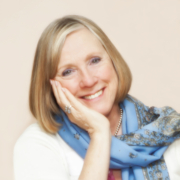
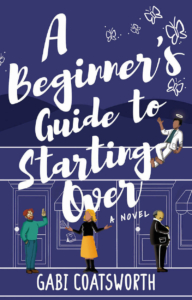
Gabi Coatsworth
A Beginner’s Guide to Starting Over
Pequot Library
Tell us a little bit about yourself.
I’m a British-born writer who’s spent most of my life trying to figure out how America works by living here. So, if you find a British flavor in my books, don’t be surprised. I’ve had short stories and essays published in journals, and my debut women’s fiction novel, A Beginner’s Guide to Starting Over, was published in April 2023. Unlike many writers, I can’t write in coffee shops because they’re too distracting, and I only drink coffee as a last resort. But I did begin my first (unpublished!) novel on a bus in Vietnam, so there’s that.
I live in Connecticut in a cottage that’s American on the outside, and English inside. If I’m not writing or traveling, I’ll be in my flower garden, wondering whether to weed while holding a cup of my preferred beverage, strong English tea – I believe Earl Grey is for the weak.
I run writers’ groups IRL and on Zoom, and you can find me all over the internet. Start at my website, where you’ll find my blog for writers, and my social media links.
Tell us a little bit about your winning book.
A Beginner’s Guide to Starting Over is an entertaining novel set in a small imaginary town in Connecticut. Here’s the gist of the story. It’s time for forty-something widow Molly Stevenson to stand on her own two feet. With blind dates, a needy ghost, and her small-town bookstore in trouble, she’s going to need all her inner strength to prevent another unhappy ending.
Still grieving the death of her beloved husband, the last thing she needs is her sleazy landlord raising the rent to drive her bookshop out of business. And she doesn’t need a new man, either, no matter what her friends say.
Now this mild-mannered indie bookstore owner must find the inner strength to turn the page to a brand-new chapter. So she’s almost relieved when the ghost of her husband arrives claiming he’s there to help. But is he? Seems he has some issues of his own.
With a little nudge from beyond the grave, the mild-mannered bibliophile hatches a plan to revitalize her boutique and keep the doors open. But with everyone, including her spectral spouse, insisting she start dating again, Molly isn’t sure what’s worse—the dates she meets online or the love of her life trying to find her a new man—who’s not quite as good as him.
Something is going to have to give.
What made you want to be an author?
I’ve always enjoyed writing, but my business career didn’t give me much scope for anything creative. So when I turned fifty, I decided to take a writing course with a local teacher, and enjoyed it so much I never looked back.
How have libraries played a role in your indie author journey?
I love libraries! I’m very lucky to have four local libraries that support my work, and more around the state who’ve asked me to visit for author talks and signings. I’ve also given workshops about how to get a memoir started, and joined open mic evenings, talks by other authors, writing conferences and workshops, and more. I don’t use these libraries to write, because I have a great writing space at home, but I know I can always find help with research, encouragement from the librarians, and a quiet place to read. One even has a coffee shop, where I can meet writing friends. I run two groups for writers at the Westport Library, and even recorded the audiobook for my memoir in their studio. I couldn’t live a writer’s life without them!
Do you have any advice for aspiring indie authors?
I always recommend writing badly and aiming low. That’s because bad writing can be fixed (all writing needs editing, no matter how good one thinks it is) while if there’s nothing on the page, there’s nothing to improve. Aiming low means a writer needn’t aim to set a high goal to get them going. If you aim to write for two hours a day seven days a week and you only write for one hour and fifty minutes for six days a week, it can feel like you’re failing. So I suggest setting a goal you think is very low, and exceeding it, because that encourages one to keep going, which is the most important thing!
2023 Florida Author Project Winners
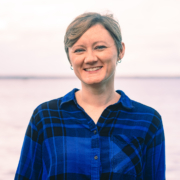
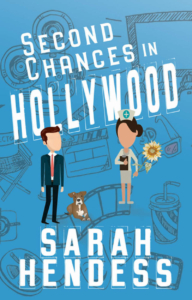
Sarah Hendess
Second Chances in Hollywood
Seminole County Public Library System
Tell us a little bit about yourself.
I’m a writer/editor/mom/spouse/teacher in Central Florida with the dream of becoming a full-time author. I was born in Pittsburgh, where I attended high school and college, but I spent a good chunk of my childhood in Kansas. I loved watching the old TV Westerns when I was growing up and I still watch them from time to time when I need comfort-food viewing.
Tell us a little bit about your winning book.
I have my son’s colic to thank for Second Chances in Hollywood! One day during a particularly nasty screamfest, I turned on the TV for comfort and found an episode of “Bonanza” just starting. You can’t resist bouncing when you hear that theme song, and it was the perfect cadence to get the baby to stop screaming and fall asleep. I watched “Bonanza” A LOT the next few weeks! As I was watching, I got to wondering about the experience of filming the show, so I started researching what that was like for the actors. It was such an intense production schedule that I marveled how they didn’t fall ill left and right from the stress. And thus the idea for Second Chances was born.
What made you want to be an author?
I’ve always loved stories. I taught myself to read when I was four, and shortly after, I wanted to make up stories of my own. I wrote my first short story on my mom’s typewriter when I was six. It’s just a love I’ve always had.
How have libraries played a role in your indie author journey?
I practically grew up in the Hutchinson Public Library in Kansas! My family didn’t have a lot of money, so the library provided the stories I so desperately wanted to read. As an adult, I’ve connected closely with the Seminole County Public Library System here in Central Florida, and they’ve been amazing supporters of my book.
Do you have any advice for aspiring indie authors?
Don’t compare your writing journey with anyone else’s. If you write every day, you’re a writer. If you write once a week, you’re a writer. If you write only once a year, you’re still a writer. Let the books come along each at their own pace, and enjoy the ride.
2023 Illinois Author Project Winner
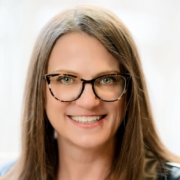
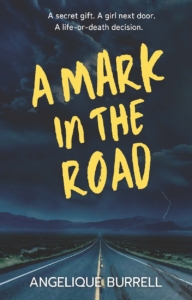
Angelique Burrell
A Mark in the Road
Naperville Public Library
Tell us a little bit about yourself.
I was born and raised in Illinois and have taught high school English in the Chicago suburbs for 31 years. I’ve taught most courses that a high school English program can offer and have worked to share my love of reading and writing with students to encourage life-long readers and storytellers.
Teaching creative writing — nonfiction, prose, and poetry — rekindled my desire to write. I couldn’t ask students to be vulnerable in their writing when I wasn’t taking the risk myself. Now, my mental escape is sitting by the fireplace and writing fiction.
Aside from teaching and writing, I love to people-watch in town with my husband, play with our new puppy, and go to Lake Tahoe as often as possible.
Tell us a little bit about your winning book.
Whenever I’ve driven over or seen skid marks in the road, I’ve wondered what happened to cause them. When my family started driving 2,000 miles so our dog could vacation with us in Lake Tahoe, my wondering turned to “what-if.” That is when Mason, the main character, was born. He has the ability to see the stories behind the skid marks on the road but that ability comes with a cost.
When Mason’s long-time crush and next-door neighbor asks him to drive cross-country with her, he is hesitant. She doesn’t know his secret and the thought of driving over so many skid marks is daunting. His reluctance turns into urgency when he learns that a woman is missing and the skid marks left near her abandoned car might hold a clue to what happened to her — if he can drive 2,000 miles before they disappear.
What made you want to be an author?
I can’t pinpoint when I wanted to be an author. I’ve been surrounded by stories and books my whole life, from the tales my grandfather told to the books my parents read to me and my sister. Having readers and storytellers in my life taught me the value a story holds for the reader and the teller. I guess my desire to create stories is a natural extension of that.
How have libraries played a role in your indie author journey?
When I was in college, I was hired as the lone “librarian” at a rural elementary school. Sensing I was over my head, I did what any college student would do. I called my mom. The bonus for me — my mom has a degree in library science. With her help, I settled into my role of organizing, decorating, and helping students find books. Thirty-plus years later, I remember how excited the kids were for library day, when they could pick out new books for the week and gather around to have a story read to them.
More recently, the Lincoln Award, sponsored by the Association of Illinois School Library Educators, has been an inspiration for me as an educator and a writer. My school’s participation in the Lincoln Award program helps me connect high-interest and engaging young adult literature with otherwise reluctant readers. The program also helped me find my genre to write by opening me up to a wide-range of young adult novels when I had been living in a world of classic literature.
Do you have any advice for aspiring indie authors?
Write the way you write. For a long time I was intimidated by the writers I taught. I knew I couldn’t write like James Joyce, Toni Morrison, Virginia Woolf, and so many others. I let that fact stop me from writing. When I accepted my voice and wrote for myself it was freeing.
Other than that, I can share what has helped me do the actual work of writing. Since I work full-time, it is easy to get caught up in the busyness of life, especially when my kids were younger. I started writing again by carving out 20 minutes on Thursday evenings. Not much time, but it was easy to commit to. And it got me writing over the weekend.
I think it was Stephen King in his book “On Writing” who said that you should end a writing session knowing what you’re going to write next — it makes it easier to sit down and write again. I try to do that — not write until my ideas are exhausted but stop knowing what to write next. I’m less likely to procrastinate that way.
2023 Louisiana Author Project Winner
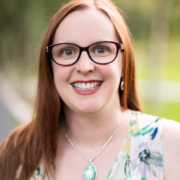
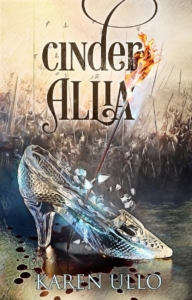
Karen Ullo
Cinder Allia
East Baton Rouge Parish Library (EBRPL)
Tell us a little bit about yourself.
Karen Ullo is an award-winning author and the editorial director of Chrism Press, which publishes fiction from Catholic and Orthodox Christian perspectives. She holds a MFA in screenwriting from the University of Southern California and is also a classically trained soprano. She lives in Baton Rouge with her husband and two sons. You can find her on the web at karenullo.com.
Tell us a little bit about your winning book.
What if the happy ending dies before the fairy tale even begins?
The original idea for Cinder Allia came many years before I wrote it. I was in my mid-twenties, and a group of my girlfriends from elementary school, several of whom had moved away for school or work, got back together and had a sleepover. All of us were single at the time, and around 3 AM, we started to wonder–where were our Prince Charmings? Fairy tales had promised us princes. What if something had gone wrong with the plan? What if Prince Charming’s guardian angel had made a mistake, or gone on vacation, and the prince had died before we could meet him?
Fast forward several years to a time when I was happily married with two children. I remembered that conversation and thought, that really was a good idea for a story. I replaced the guardian angel with its fairy tale equivalent, the fairy godmother…and Cinder Allia was born.
What made you want to be an author?
You could say I didn’t have much choice in the matter. I remember being about four years old, desperate to learn how to make letters on a page so I could get the stories out of my head. I haven’t stopped writing since.
How have libraries played a role in your indie author journey?
I did not grow up in a wealthy family, so for me, the library was the primary source of the formative reading I did throughout childhood and high school. Nearly all of the works I now cite as influences in my own writing, I first encountered at the library. The local library has also been very supportive of me as an author, and has stocked my books since the very beginning.
Do you have any advice for aspiring indie authors?
I often advise aspiring authors to take an acting class. Many of them think I’m crazy because they’re introverts who don’t want to perform, but it isn’t about taking the stage. It’s about learning to create a character, to take on a new persona not only in mind but in body, to learn to move and think and emote like someone else. It’s an invaluable skill set for an author.
2023 Minnesota Author Project Winners
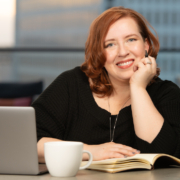
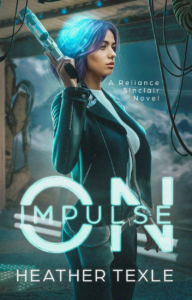
Heather Texle
On Impulse (Reliance Sinclair, #1)
Scott County Library
Tell us a little bit about yourself.
I’m a science fiction author with a deep-seated love of learning. My creative fuel is drawn from the unconventional, bizarre, and “I-can’t-believe-that’s-true” moments that make life interesting.
I grew up in a small town in rural Wisconsin but moved to Minnesota for college and still live there with my husband and two cats, Mew and Spots. My life has taken me to some unexpected places, including hiking up a glacier in New Zealand and being stranded on a cruise ship in the Gulf of Mexico. Through my work, I hope to inspire and entertain readers, inviting them to join me on a journey of discovery, imagination, and unwavering curiosity. You can usually find me hanging out on Facebook or Instagram or over on my website, heathertexle.com.
Tell us a little bit about your winning book.
On Impulse is the first book in my Reliance Sinclair series. It’s an action-packed science fiction novel about a former law enforcement agent accused of murdering her best friend. She goes on the run to find the real killer and clear her name, using her training to avoid being captured. Oh, and it’s set in space!
What made you want to be an author?
I’ve always been an avid reader, but I didn’t start writing until I was in my early thirties. It seemed like most authors talked about writing from a very young age. I thought that since I hadn’t been penning manuscripts by the age of six, I’d already missed my opportunity to become a writer. Then I attended a book signing by Chloe Neill. It was the first time I’d met an author in person. She talked about how she didn’t start writing until she was an adult, and something clicked in my brain. Two weeks later, I wrote the first chapter of a book.
How have libraries played a role in your indie author journey?
I was a library kid from an early age. My hometown was small, so my elementary school’s library really opened the world to me. I’ve always been a bit of a book nerd. Some of my favorite series were classics like The Black Stallion, Anne of Green Gables, and Little House on the Prairie. Then in high school, our library had an extensive collection of Dragonlance and Chronicles of Pern books that got me into fantasy and science fiction. As an adult and author, I appreciate all the resources libraries offer. Expenses for writing and self-publishing quickly add up, but libraries can help keep costs manageable. You can check out nonfiction books on the craft and research materials, as well as fiction books to see how your genre progressed and what is currently on trend. They also offer a distraction-free (and cost-free) place to work, which can be hard to find elsewhere.
Do you have any advice for aspiring indie authors?
Be Consistent. Writing is a tortoise-and-the-hare kind of situation. Slow, steady progress will get you further than a few days of furious writing here and there. The brain is like any other muscle in that the more often you exercise it, the easier the task becomes. One of my favorite phrases that exemplifies this is “BICHOK”—Butt in Chair, Hands on Keyboard. The book isn’t going to write itself!
2023 Missouri Author Project Winner
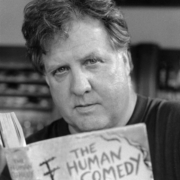
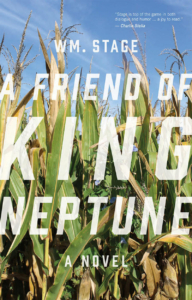
Wm. Stage
A Friend Of King Neptune
Webster Groves Public Library
Tell us a little bit about yourself.
In a checkered life Wm. Stage has been an ambulance driver, soldier, public health officer, journalist, and process server. Orphaned at birth, he spent the first months of his life in the care of the good sisters of St. Agnes Foundling Home in Kalamazoo, Michigan. Adopted by loving parents, he grew up in Grand Rapids, an adventuresome and inquisitive child. He joined the army in the summer of 1969 to get out of probation. Fortune sent him to Germany as a medical corpsman on the 34th and 80th Ambulance Train Company. He holds a Bachelor of Philosophy degree from the now-defunct Thomas Jefferson College, an “educational experiment” run amok in the cornfields of Southwestern Michigan. He landed in St. Louis in 1978, having been recruited by the CDC as an STD epidemiologist, and has stayed for the duration. He has made his living as a journalist/columnist for over 30 years and is the author of 14 books, five of them fiction. From 1983 to 1991 he was in the Air Force Reserves at Scott AFB in Belleville, Illinois. He was called into three months active duty during Operation Desert Storm. He always cleans his plate, but windy days make him edgy.
Tell us a little bit about your winning book.
This is the second novel featuring Francis X. Lenihan, a process server in St. Louis. The old saw “write what you know” rings true here as the author is a former journalist turned process server at the age of 47, in 1998. Not only do I know the profession I know the territory as well, having lived in St. Louis and written about it for 45 years now. In this story, Francis’ old army pal drops in from Germany on his way to Southern Illinois to retrieve certain spoils from WWII which are stored in a quaint and endearing museum. I also am quite familiar with Southern Illinois, having had many escapades there in the ’90s. A friend has called the plot picaresque and that may be true but not so picaresque as say, Don Quixote. St. Francis of Dogtown, which introduced F. X. Lenihan, was definitely a crime novel. Since there aren’t any murders, rapes, or bludgeonings in A Friend Of King Neptune, I have called this one an adventure novel. Both of them are pretty funny, though. I am a prose humorist at heart.
What made you want to be an author?
I love to read so it is only natural I should want to produce prose that others may read; that is the ultimate flattery. Besides, I’ll never work in the trades like my dad and my uncles. I read once where D. H. Lawrence showed his father his first royalty check and the father, a simple working man, guffawed, saying, “How now? That book never worked a day in its life!”
How have libraries played a role in your indie author journey?
I have always used libraries whether public or school. I vividly remember reading in grade school the biographical series of books on remarkable people like Benjamin Franklin, Robert Fulton, and Marie Curie. I learned the challenges they faced and how they used their innate resourcefulness to achieve great things. I drew inspiration from reading those books as a child, and as an adult, I certainly derive enjoyment, if not inspiration from books borrowed from the library. Here in St. Louis, I visit the Webster Groves Public Library about every 10 days for another audiobook. I didn’t latch on to audiobooks until 2019, which is surprising given that I crave fiction and I am in the car for 4 to 6 hours a day serving summonses and subpoenas. It’s a perfect fit, that. Lastly, as an author, if you asked would I rather have my books in a bookstore or a library, I would say the latter.
Do you have any advice for aspiring indie authors?
Self-discipline all the while. You need to make yourself write the piece day-in-day-out in order to form continuity, to keep the thread unraveling. This way in the time you are not writing your novel, those hours between leaving off today and sitting down to it tomorrow, you are ruminating about what’s going to happen next, how it’s going to happen, what could have been said better, some crafty plot twist that was conjured because you have that continuity to work with.
2023 Nevada Author Project Winner
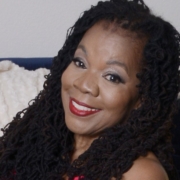
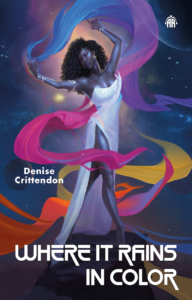
Denise Crittendon
Where it Rains in Color
Henderson District Public Libraries
Tell us a little bit about yourself.
I’m an award-winning journalist who has worked as a staff writer for two metropolitan daily newspapers and as editor of The NAACP’s official magazine The Crisis. I also launched and edited a Michigan-based family magazine for nine years. After writing “Girl in the Mirror, A Teen’s Guide to Self-Awareness” in 2000, I became a youth motivational speaker. I love the idea of empowering and inspiring both youth and adults. I’m very energetic and make it my mission to try to stay positive and upbeat. I exercise a lot and, when I can, I enjoy taking long walks alone so I can reflect and commune with nature. I honestly believe the world would change overnight if we paid closer attention to all the lessons being taught by the forests, the elements and the various life forms with whom we share the planet.
Tell us a little bit about your winning book.
Where it Rains in Color is an Afrofuturist sci-fi/ fantasy that often feels like a mission wrapped up in a novel. I describe it that way because it uplifts Black women and challenges misogynoir. In the novel, the protagonist is a shimmering blue-black icon who is noted for her beauty. Although she’s pampered and lives on an idyllic resort planet, her life — and the fate of the galaxy — changes when she’s confronted with a mysterious skin ailment. Her subsequent transformation leads to the knowledge that her planet is linked to the mysterious Dogon Tribe, which is one of the indigenous ethnic groups in Mali, West Africa. The novel taps into actual Dogon mythology and also explores colorism as it flips beauty standards and catapults people of African descent into a grandiose future. Some aspects of the book actually came to me one night in a dream.
What made you want to be an author?
I have been longing to write books since I was 10 years old. The desire was so strong I actually made an attempt at that age. Of course, it was just a goofy, kiddie book. However, the yearning continued. It was clear to everyone in my family that I would be a writer one day. I saw journalism as the best route to my dream, so I chose it as a major and immediately went to work for newspapers. I loved being a news reporter and found my calling in stories that exposed injustices and offered comfort to individuals dealing with social ills. However, it wasn’t enough. My imagination often ran away from me, and I couldn’t stop fantasizing about the concept of other worlds and alternate realities. I wanted to move beyond fact and delve into fiction. As Einstein once said “imagination is greater than intelligence because it knows no boundaries.” That was me. I wanted to eventually remove the boundaries imposed by journalism and dive into my imagination. It took years for me to make that leap, but I’m so glad I finally did it.
How have libraries played a role in your indie author journey?
As a child, there was nothing quite like exploring the library, especially during the summer. I still recall making bi-weekly visits and then getting lost in a special book. I depended on library books because there’s no way my mother could afford to constantly buy new books for me. Thank God, she didn’t have to. It was just understood that if I my brothers and I wanted to read, the library was the place to go. My personal faves were “Little Women” and a series I adored called “The Shy Stegosaurus of Cricket Creek.” I have no idea why I fell in love with that dinosaur. All I remember is that I couldn’t stop reading about him or searching for other adventures at the neighborhood library. I’m sure they fueled my need to think, write and get lost in a sea of ideas.
Do you have any advice for aspiring indie authors?
Don’t worry about how much time you have, how old you are or how you think the public will receive what you are writing. (1.) I had no time — I had to work on the novel in between writing projects that paid my bills. (2.) The clock was ticking, and I realized I was only months away from 70 and still unpublished. I shrugged and kept writing. (3.) When I first came up with the concept of a Black planet, the movie The Black Panther didn’t exist, and the notion of an all-Black world in space was foreign. I did it anyway. By the time I finished, society was ready for the idea. So, my moral is this: Begin where you are and let your passion guide you. As mythologist, Joseph Campbell, once said: “Follow your bliss and the universe will open doors where there were only walls.”
2023 New York Author Project Winner
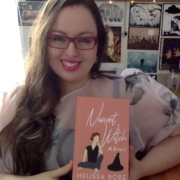
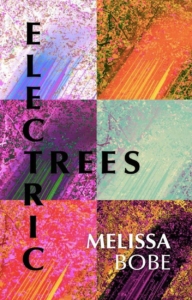
Melissa Bobe
Electric Trees
Uniondale Public Library
Tell us a little bit about yourself.
I never know whether to start something like this with fun facts or serious stuff. I imagine most writers begin with what they do for work, but what if what people really want to know are my sun, moon, and rising signs?
I’ll start with work. When I’m not writing, I am a children’s librarian. I’m trained to work with kids from birth through adolescence and their caregivers, but my favorite ages are transitional because I enjoy a little chaos. Right now, I run a lot of baby and toddler classes. In a past life when I did freelance writing programs in libraries, I worked mostly with tweens. Whether it be tweens or toddlers, I never completely know what to expect from my library kids and, thank goodness, I’m never bored.
Before I was a librarian, I taught English at public universities in the New York tristate area. I loved teaching; if it had paid the bills, I probably never would have stopped. Even though I had to move on, I’m still surrounded by teachers. My husband is a teacher, my parents were both teachers, and many of my friends teach, as well. In a time when books, libraries, education, and literacy seem more important than ever, I feel I’m in really good company.
In my free time, I’m a volunteer for the NYC region of National Novel Writing Month and for the NY Metro region of the Society of Children’s Book Writers and Illustrators. My husband and I live with our five rescue cats in an apartment with too many books and whichever of my plants are still alive (if something doesn’t meow at me, I don’t always remember to feed it). I love cooking, ballet, and spending time at home. Someday, I hope to keep bees.
Oh, and in case anyone was curious: Virgo sun, Aries moon, Sagittarius rising.
Tell us a little bit about your winning book.
Electric Trees is a strange collection! For a while, I was calling it my home for my misfit narrative children, stories that weren’t really working anywhere else. They’re all speculative fiction but range widely, from the magically real to contemporary gothic to horror. The stories in the collection aren’t always easy; I think they try and provoke readers to engage on a level that’s less stable, more slippery, and hopefully in ways they may not be expecting.
In building the concept for the book, I was inspired by the phenomenon of electric treeing. In the most succinct terms I can manage from the Wikipedia rabbit hole I fell down: electric trees occur when there’s a small fault in a piece of insulation and electricity spikes through, creating a formation that looks a lot like the roots and/or branches of a tree. I was drawn to this idea of something manmade that we wouldn’t necessarily associate with the organic nevertheless taking the form of what is essentially a symbol of the natural world. And then I found myself working on this project that played with stark contrasts and contained material that seemed oppositional, even as the stories are thematically linked.
The book is divided into three parts: Light, Fissures, and Outages. In each part, things get progressively darker, and Outages is where you should probably pause that bedtime reading and wait until morning. I don’t leave readers without hope at the end; I think a mark of a good horror story is that it knows where to place glimmers of light. Overall, the collection should take a reader on a journey, though the nature of that journey will depend as much on what they’ve brought to it as it will on what they find along the way.
What made you want to be an author?
It’s hard to boil this down to a single moment or inspiration. My mom is a retired elementary bilingual special education teacher, and her motto from the moment I was born was, “Flood them with books!” And she really meant it: I had books all over the place. She encouraged me to write as much as I read, teaching me word families and phonics I think before I was even in school. She also helped me make my first “books” at a very young age, binding the chaotically illustrated pages together with lanyard or string. And my family are all storytellers, for the most part. New Yorkers love to talk, and so do Puerto Ricans, and we’re both! So I was hearing stories throughout my childhood, understanding their structures and how to use them to engage others.
I got serious about putting my books out there after a phone call with my friend Eva Papka from high school. We had been writers together back then; I was editor of the school’s literary magazine one year, and then she was the following year. We’d read each other’s stories religiously, delighting in our imagined worlds and sharing them with each other. Eva called me up after we’d finished college and had lost touch for a bit, and we both expressed this kind of quiet despair we’d been feeling because we had stopped writing. It really felt like we’d lost our way, but when we reconnected, we decided together that it was time to recover ourselves. She’s now one of my very talented critique partners, and we haven’t stopped writing since.
How have libraries played a role in your indie author journey?
I was actually pretty surprised to end up being a librarian, at least this early in my life (more on that in a minute). But I was always a library kid, happy to volunteer and attend programs with my friends, and reading voraciously, of course. I was lucky, too, because some of the librarians in my childhood were fantastic.
There was the school librarian at the elementary school I attended, who was an extremely serious, elderly nun. We weren’t allowed to make any noise, but we could look at and check out whatever books we wanted, and she kept a really contemporary, honestly pretty badass collection: The Baby-Sitters Club, Scary Stories to Tell in the Dark, and the Bunnicula books were my favorites. She used to let me and my friends come in from the schoolyard when it was freezing out and we would stamp and sort books with her. I’m not sure whether she was really that fond of kids, on reflection, but she always struck me as a very fair adult, and I liked her.
Then there was my mentor at my local public library, Terry Ain. I learned so much from her, and I really admired even then how she could laugh with the teens she worked with (and honestly, that she had enough patience for me and my many very strong opinions and ideas about pretty much everything). She actually was the one who encouraged me to go for my PhD and not directly into libraries! She’d been a classroom teacher first and enjoyed the transition to public librarian as her second career. When I told her I was considering becoming a professor instead of going to library school, she told me to go for it! And she really drove home the idea that I would likely have multiple careers, which I’m grateful for to this day. I don’t think either of us was thinking that being a librarian would be more financially stable than teaching college, but the notion that I could always do something else really helped me when it became clear that was the case.
Now that I’m in a place where I’m working in the profession, I can see how formative libraries have been for me, in ways I didn’t even consider until I found myself providing them to others. The public library is a really important community space, and I’m not just saying that because I work there! I’m really trying to foster support for indies in my work. I even built three new collections into our children’s department with indie authors in mind: Local Authors, Storytellers, and Author Resources.
The Local Authors collection features picture books by authors who are a part of our library community, both independently and traditionally published. My current supervisor, Chrissy Hirsch, is a wonderful children’s librarian and department head, and she’s passionate about bringing local voices into the library. Many of the books you’ll find in the Local Authors collection are by people she’s brought in for storytimes and signings.
The Storytellers collection is probably my favorite of the three. It’s a collection of writing prompt books for kids, and I’ve been thrilled to see many of the books circulating among our patrons. I’ve always felt the need to support my local author communities, and building a collection to foster the newest creative voices as they learn to tell their stories has been such a rewarding way to do that.
The Author Resources collection is for adults who want to write for children. It’s a combination of craft and market/profession-focused books that will guide authors who want to enter the kidlit industry, whether as indies or as traditionally published writers. After a handful of adults had come into our department seeking guidance on how to write for kids, I figured a dedicated section of resources wouldn’t hurt!
I’ve been long-winded here, but this is a library-related award, after all! Libraries are spaces where anyone and everyone can receive access to information, resources, technology, and community-targeted activities. What other space can say as much? And what author wouldn’t appreciate a place that will happily and certainly support their work, whether by providing them with tools and research materials that contribute to the writing of their book, or featuring the finished tome on the shelf?
Do you have any advice for aspiring indie authors?
Go to the library! I’m only half-joking—you absolutely should be using whatever affordable and/or free resources you can find when you’re starting out, and your local library will definitely be a place to start looking for those.
Don’t be afraid to seek out community. If Eva and I hadn’t shared that phone call, we might never have started writing again. Then we joined our local NaNoWriMo region together, where we met Sara Carrero. Sara’s a really talented writer who quickly became a close friend and critique partner. The three of us created a true writing practice together, one which involved long days spent discussing each other’s work and writing together, all while enjoying lots of good food, of course! For years, I thought I would never need another critique partner.
This is where the next piece of advice comes in: be open when someone seeks you out, even if you think your schedule is a little full. When another old friend of mine, Kate Schnur, called me up to say, “All right, Melissa, I’m ready to do this creative writing thing with you,” I thought, how am I going to handle more critique meets with everything I have to do? Can I commit to another friend who wants to swap work? But Kate is an incredible person who I love, so I said yes. Now, I could kick past-me for my hesitation. I don’t know how the stories I’ve written since we started meeting would have come out of me without her insights.
My three critique partners are invaluable to me, creatively and personally. Sometimes it means going a little outside of your comfort zone, but finding someone who shares your passion and wants to help you succeed is always worth it. I’ve heard some writers say that they’ve faced ridicule, scorn, even mockery from people in their lives when they reveal that they’re writing. This always breaks my heart, but I also try to remind other writers that many creative communities probably come into existence because of crappy relatives who don’t want to hear about your novel. There are so many wonderful spaces out there, in person and online, where a bunch of fellow book nerds are just waiting to hear you talk about your writing! Look for them. If you can’t find them, message me or some other librarian and we’ll help you find them. They’re out there, I promise.
Be open about your writing, too, as much as you can. Owning that this is something you want to do out loud or online, where other people can hear/read you, is sometimes enough to help you hold yourself accountable. It’s scary at first, but the more you say to the world, “I’m a writer,” the more the world will believe you, and much more importantly, the more you’ll believe yourself.
2023 North Carolina Author Project Winners
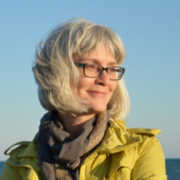
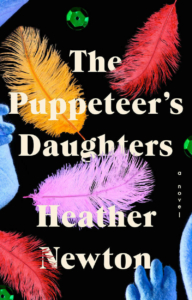
Heather Newton
The Puppeteer’s Daughters
Buncombe County Public Libraries
Tell us a little bit about yourself.
I grew up with a mother, Suzanne Newton, who was (is) an author of young adult novels. With a writer for a mother, I began creating books of my own as soon as I was old enough to hold a stapler. I went to Carnegie Mellon University in Pittsburgh planning to major in writing, but once there discovered a love for History, and also discovered I was too young to have anything interesting to write about. I majored in History and then did what liberal arts majors do when they can’t find a job–I went to law school, at UNC Chapel Hill. I began writing seriously after starting my first legal job in Boston, and haven’t stopped since. I live in Asheville, NC, where I practice law, teach creative writing for UNC Asheville’s Great Smokies Writing Program and Charlotte Lit, and co-run the Flatiron Writers Room, a space for all things literary in western NC, which I founded in 2017 with Maggie Marshall. My husband, a nurse, and our newly-adult daughter, keep me from taking myself too seriously.
Tell us a little bit about your winning book.
At his 80th birthday party, renowned puppeteer Walter Gray surprises his three daughters with an announcement that there is a fourth. A torn paternity test, and a will that places a condition on each daughter’s inheritance, suggest that the missing daughter isn’t a figment of his dementia. His daughters—by different mothers—react differently to the news. Jane, the oldest, remembers the scarcity of her childhood and doesn’t want another sister to share her birthright. The middle sister, Rosie, born out of wedlock, sees the missing sister as her key to acceptance as a full member of the puppeteer’s family. Cora, the youngest, born after Walter achieved fame and fortune, is most concerned with extricating herself from running Walter’s company so that she can pursue her own innovative puppetry. In searching for the fourth daughter and struggling to meet the conditions of their father’s will, the sisters must confront and renegotiate their relationships with their father and each other. Infused with fairy tales that sometimes spill magic into the sisters’ real lives, The Puppeteer’s Daughters is about fathers and daughters, but also about the cost and rewards of claiming a creative life.
What made you want to be an author?
Growing up, visual art was my thing, but in high school I received affirmation for my fiction writing from teachers and from “real” writers who judged a local creative writing contest and encouraged me to keep writing. I also got a job my senior year editing and writing for a youth newspaper produced by a state agency. I began to realize that words were my medium.
How have libraries played a role in your indie author journey?
My earliest memories include the book mobile and the Richard B. Harrison Library in Raleigh where I and my three siblings would each be allowed to check out 10 books (40 total) each week that we could share later. I still get excited when I walk into a library, and I so appreciate the support librarians have shown to me and my work since I first published.
Do you have any advice for aspiring indie authors?
Don’t think you have to do this alone! Take classes, form a writing group, attend readings at your local bookstore, read your work at open mic events. Writing community is the single most important thing that will make you a better writer and keep you writing through challenging times.
2023 Ontario Author Project Winners
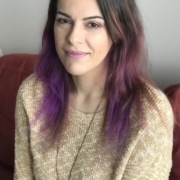
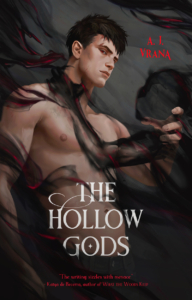
A. J. Vrana
The Hollow Gods
Toronto Public Library
Tell us a little bit about yourself.
A. J. Vrana is a Serbian-Canadian academic and writer from Toronto, Canada. She lives with her rescue cats, Moonstone and Peanut Butter, who nest in her window-side bookshelf and cast judgmental stares at nearby pigeons. She holds a PhD from the University of Toronto, and her doctoral research examines the supernatural in Japanese and former Yugoslavian literature and its relationship to modern nation-building and historiography. When not toiling away at caffeine-fueled, scholarly pursuits, she enjoys jewelry-making, cupcakes, and concocting dark tales to unleash upon the world. A. J. Vrana’s published works include The Chaos Cycle Duology: The Hollow Gods (2020) and The Echoed Realm (2021), the companion novel Wildblood (2024) from Parliament House Press, and the romantic short story collection, Stray Feathers: Extras from The Chaos Cycle (2022). Her short fiction includes “These Silent Walls” (2020), printed in Three Crows Magazine, and “Sapling,” (2023) from Clan Destine Press’ horror anthology This Fresh Hell.
Tell us a little bit about your winning book.
Black Hollow is a town with a dark secret.
For centuries, residents have foretold the return of the Dreamwalker—an ominous figure from local folklore said to lure young women into the woods and possess them. Yet the boundary between fact and fable is blurred by a troubling statistic: occasionally, women do go missing. And after they return, they almost always end up dead.
When Kai wakes up next to the lifeless body of a recently missing girl, his memory blank, he struggles to clear his already threadbare conscience.
Miya, a floundering university student, experiences signs that she may be the Dreamwalker’s next victim. Can she trust Kai as their paths collide, or does he herald her demise?
And after losing a young patient, crestfallen oncologist, Mason, embarks on a quest to debunk the town’s superstitions, only to find his sanity tested.
A maelstrom of ancient grudges, forgotten traumas, and deadly secrets loom in the foggy forests of Black Hollow. Can three unlikely heroes put aside their fears and unite to confront a centuries-old evil? Will they uncover the truth behind the fable, or will the cycle repeat?
A perfect story for contemporary fantasy readers who love their narratives razor-sharp and their secrets dark and deadly.
What made you want to be an author?
Although I have always loved writing stories, it wasn’t until I began studying literature in university that I truly began to explore the power of storytelling. It is uniquely human to seek a deeper understanding of our experiences–both collective and individual–and to give them meaning that can help make sense of our messy world. Fiction in particular has been a powerful tool in my journey as a human, and I have found it to be a far more potent avenue of exploration and meaning-making than explicit or clinical disciplines.
How have libraries played a role in your indie author journey?
As a child, libraries were one of the places my mom would take me when I wasn’t busy with homework or twiddling my thumbs at school. We are an immigrant family, and although Canadian culture was new to my parents, literacy and a love of reading were vital to my exposure to different ideas, peoples, and ways of life. I have come to see libraries as one of my biggest allies in my publishing journey; they are the backbone of literary culture and do not discriminate based on class or ability. Anyone can check out a book in the library, and authors who have no broken into traditional publishing can have their books seen and read.
Do you have any advice for aspiring indie authors?
Make friends! Publishing can be very isolating, especially in the indie world where you are a one-person show. However, there is a wonderful community of authors out there, and they are a trove of knowledge and support. Learn from others and don’t be afraid to ask for help! Making friends with other authors has been one of the biggest factors in making my publishing journey a joyous one. There will always be disappointment and frustration, but having a community can make such a difference.
2023 Texas Author Project Winners
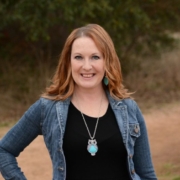
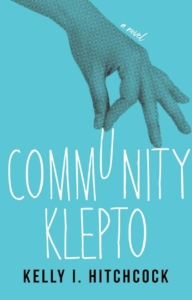
Kelly Hitchcock
Community Klepto
Austin Public Library
Tell us a little bit about yourself.
I’m a literary fiction author, humorist, and poet now living in Austin, Texas. I have published several poems, short stories, and creative non-fiction works in literary journals, and I’m the author of the coming-of-age novel The Redheaded Stepchild and the short story collection Portrait of Woman in Ink: A Tattoo Storybook. Raised by a single father in the small town of Buffalo, Missouri, I have fond memories of growing up poor in the Ozarks that strongly influence my writing and way of life.
I’m a graduate of Missouri State University, where I earned a Bachelor of Arts in Creative Writing, with no idea how I would make a career out of my degree choice, but a well-timed technical writing internship allowed me to find a place for myself in software and carve out time to write fun things. My fun-things writing has garnered me world renown among an audience of at least two dozen people. I’m also an editorial contributor to Austin Moms and Zibby Mag, and a member of the Writer’s League of Texas.
Because I have seven-year-old identical twins and a full-time job, writing and picking up LEGO are the only other things I can devote myself to, but I still find time to read about 100 books a year and watch 80,000 hours of Bluey in the background (Grannies is my favorite episode).
Tell us a little bit about your winning book.
Community Klepto is a humorous fiction novel that explores the mind of a semi-psycho you’ll love to root for.
Ann Josephson is a twenty-five-year-old sociopath whose compulsive kleptomania manifests itself in the most unlikely of places: the community center where she works out every day. The walls of the community center insulate her from the terrors of the outside world, which include her freelance work as a graphic artist; her socialite parents, who pay the better part of her living expenses; her therapist, who devotedly punches the clock; and the dark void of romantic relationships.
As Ann battles the inner demons that plague her millennial psyche, she must also battle the fiends that plague her at the gym: the loudly grunting beefcake who can’t be bothered to drop his weights at a reasonable volume, the naked old lady in the locker room using a towel as butt floss, the housewife in yoga pants that obviate the need for yoga wheeling her double stroller up and down the indoor track. Set in suburban Kansas City in the early 2010s, Community Klepto—a droll combination of Bridget Jones’ Diary and Choke—makes incarnate the characters and shenanigans that go on in every gym in the world.
Community Klepto was named a finalist for the 2023 Montaigne Medal of the Eric Hoffer Book Awards, a finalist in the 2023 Reader’s Favorite Book Awards, and is now the Adult Fiction winner for the Texas regional contest of the Indie Author Project. While I have no plans for a sequel of Ann Josephson’s 30s or 40s at this time, life has taught me to never say never… I said that about minivans.
What made you want to be an author?
Apart from the fact that I have few other marketable skills, I can’t remember a time when I didn’t want to write books. (Okay, there was that brief period my freshman year of high school where I swore I wanted to be a defense attorney… boy, did I dodge a bullet there). I was lucky enough to have a lot of teachers, classmates, and colleagues throughout the years who recognized my talent for writing and encouraged me to keep honing my craft.
As a weird introverted kid, I spent a lot of time in my own head making up stories, and wrote all the time. I learned quickly that people wouldn’t think I was a weird loner if I was holding a book, and I’ve never been without one since. It never occurred to me that I would do anything but write, despite being told by many naysayers that writers came from places like New York City and Los Angeles, not Buffalo, Missouri.
I entered college thinking I’d become an English teacher, and follow in the footsteps of those who encouraged me, but I quickly learned that I did not share the same passion for teaching as my predecessors. I worried what my dad would say when I told him I was changing majors to creative writing and wanted to write books, but he told me the world would always need well read people who could communicate effectively, and I make a future for myself no matter what.
Then I started going to places like my local library, Barnes & Noble, and Book People, and told myself I was going to have a book on their shelves someday. And now I do!
How have libraries played a role in your indie author journey?
As I wrote in my Read Her Like an Open Book article last year, libraries were my safe haven growing up as a weird kid. The entire concept of book ownership never even computed for me until I set foot in my first Barnes & Noble in high school (the same Barnes & Noble that hosted me for a launch event for Community Klepto two decades later), and it seemed like the absolute height of affluence. I had always gone to the library.
As a kid growing up in a single parent household, I never knew if there would be enough food for dinner, but I knew that every day when I walked to that library, there would be another book about Kristy, Mary-Anne, Stacy, and Claudia waiting for me, no questions asked, except “Can I see your library card?”
I remember reading the entire Sweet Valley High series, never sure if I was more of an Elizabeth or a Jessica. I didn’t own those books. I got them from the Dallas County library in Buffalo, Missouri, which I would walk to with my younger siblings from the Methodist church where our dad attended AA meetings on Tuesdays. When I wasn’t pouring coffee and emptying ash trays for a roomful of recovering alcoholics, I was reading library books.
When my second novel, Portrait of Woman in Ink: A Tattoo Storybook was accepted into the collection at the Austin Public Library, I’m not exaggerating at all when I say I cried tears of joy. The same library accepted Community Klepto before it was even released, and placed it in its Austin collection in the middle of the gorgeous central library. The same hometown library I returned Sweet Valley High books reeking of cigarette smoke to (sorry about that) hosted an event for me a month after Community Klepto‘s launch. I know I can count on libraries to keep my books on their shelves for years to come after the new wears off and the Barnes & Nobles of the world lose interest.
Do you have any advice for aspiring indie authors?
First, do what works for you. I don’t write every day, despite some authors’ insistence that you can’t be a serious writer otherwise, because it doesn’t work for my lifestyle (did I mention the full time job and two kids in 2nd grade?). I don’t have a pristine dedicated writing space. Sometimes I write at the same desk I work my day job from, and other days I want nothing more to do with that desk and write on the couch or in bed. Sometimes I fall asleep writing on my laptop at 8:30 before my kids are even asleep. None of this makes me less of a writer; it just means I do what works for me.
Second, just keep going. There were so many times with Community Klepto that I wanted to give up. I was picked up and dropped by an agent. I had a verbal offer from a local publisher a month before the COVID lockdown that fizzled out because they couldn’t afford to take on any projects in the midst of all the uncertainty. I had to tell myself (repeatedly) that if two different people were willing to take a chance on my book, even if they didn’t ultimately follow through, chances were good that a third one would as well. I just needed to keep going.
Third, be your local bookstores’ best friend. Go to their events, get to know the booksellers, and meet other authors. Amazon might put your book on its megabytes of shelves, but they won’t support your local author community like your neighborhood bookstore will.
2023 Virginia Author Project Winner
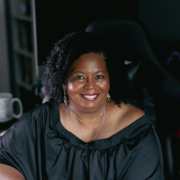
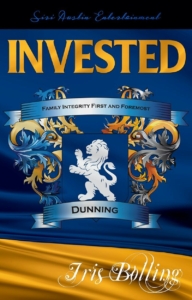
Iris Bolling
Invested
Henrico County Public Library
Tell us a little bit about yourself.
Iris Bolling is a USA Today bestselling and award-winning author of romantic suspense, thriller and a touch of sci-fi. The desire to write stories to entice the mind of readers with an eye-opening view into the world of politics, espionage, and a murder or two, three…okay, maybe more, started with her self-publishing her first novel, Once You’ve Touched the Heart.
Her debut novel, gained her the honor of being named the Debut Author of the Year a few years back…way back. Since then, Iris has been honored many times for several novels from her series, including The Heart Series with a political backdrop, The Gems & Gents series with larger-than-life CIA agents, The Dunnings tapping into the world of banking, Nate Reigns Novels, for your love of mystery and suspense, and the Brooks Family Values Series, for the love of family. In addition to her writings, she was the executive producer and screenwriter for the indie film projects The Heart Seasons 1 & 2 and the full-length movie, Deadly Sexy, based on the writings of the award-winning writing icon Beverly Jenkins. Her endeavors have led to the life she enjoys as a full-time author. Iris currently lives in Richmond, Virginia where she is working on her next book, movie project or who knows for what else…. To learn more, sign up for a free read, new releases, and upcoming news: www.irisbolling.com.
Tell us a little bit about your winning book.
Invested is the first story in the Dunning Trilogy. It’s about an African-American family who owns the 3rd largest financial institution in the world, Dunning Bank & Trust. Guided by the unwavering motto of “Family First & Foremost” the Dunning family treasures the rich history of their bank and is determined to protect it at all costs. Unfortunately, their unprecedented success is a source of discontent among influential figures in the financial industry. A sinister conspiracy aimed at stunting the bank’s growth begins. They will stop at nothing, including extreme measures such as extortion or murder to succeed. The conspiracy begins with the death of Hepburn Dunning, the CEO of DB&T, and the selection of the new CEO. When his son Myles Dunning is selected there are forces within the organization who join the conspiracy. To protect the core of the family legacy, Myles, and his assistant, Chrystina, draw strength from the family bonds and love for each other to navigate the treacherous waters to prevent the takeover from happening. Invested is a story of loyalty and the relentless pursuit of safeguarding a family legacy in the face of adversity.
What made you want to be an author?
I LOVE reading. Reading was an escape for me. It was a way to visit places and lifestyles I never knew. I wanted to do that for others. When my job became stressful, I turned to writing as a way to escape. My goal was to tell stories that would transport readers into a different world for a while and to ensure people like me were represented and celebrated as central characters. Works by remarkable authors like Beverly Jenkins, Brenda Jackson, Frances Ray, and Gwyneth Bolton, who wrote stories of diverse characters encouraged me to write my stories my way without compromising who I am as a person. At first, writing was a means to escape the everyday demands of life. Now, writing is a part of who I am. I love sharing my stories with readers.
How have libraries played a role in your indie author journey?
Libraries have been a huge part of my journey serving as both a haven and platform for sharing my stories. The local library played a huge role in offering welcoming spaces where I could connect with readers and introduce my self-published works. The support of the program for local authors was provided as an opportunity to showcase my stories. Librarians around the country open their arms to me to do signings and talk with readers. Sharon Crenshaw at Fairfield Library in Henrico County was extremely helpful throughout my writing experience. The inclusion of my novels in the inventory of numerous libraries has been significant in my journey. Having my novels accessible to library patrons has expanded my readership and contributed to the visibility of my writing. I am so thankful to librarians for their willingness to support diverse voices, and especially for opening their doors to me and other independent authors.
Do you have any advice for aspiring indie authors?
The journey of an independent author can be challenging, but persistence is your greatest ally. Never give up on your dream to write. Never allow anyone to tell you your stories are not good enough. There will always be naysayers or haters as some would put it, but never question your worthiness or that of your stories. Every story, no matter how short or long, will touch someone, and that, after all, is what writing is all about. Touching someone’s life in a way only words can. Always believe in yourself and your work. Your belief will carry you through those rough spots in your journey.
2023 Washington Author Project Winner
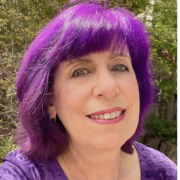
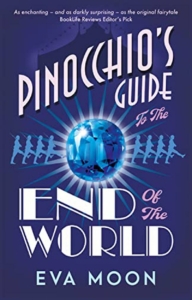
Eva Moon
Pinocchio’s Guide to the End of the World
King County Library System
Tell us a little bit about yourself.
Eva Moon is an author, humorist, songwriter, playwright, screenwriter, performer, and former Huffington Post blogger. Her plays and musicals have been staged across the US and UK, and her solo musical show, “The Mutant Diaries: Unzipping My Genes” is streaming on Amazon. Her screenplay HOUSE ODDS was a Page Awards finalist and was optioned. She has released five music CDs; her music has appeared in feature film soundtracks. Pinocchio’s Guide to the End of the World is her first novel.
Tell us a little bit about your winning book.
My book tells what happened to Pinocchio AFTER he became a “real boy.” He got his wish, but finds there’s more to being human than having the right kind of body. Inside, he still feels like that same wooden puppet.
In the wake of WWI, his struggle to fit into a human world leads to a deadly fight with a fascist officer and flight from the only home he’s ever known.
From tramp steamers to stifling sweatshops, from love to bitter heartbreak, he can’t outrun his puppet past. Returning home years later, he discovers his beloved papa, Geppetto, was spirited away in the middle of the night into a Germany newly in Hitler’s grip.
On his perilous journey, he finds a motley crew of allies, love, and an unexpected enemy who knows a secret about Pinocchio’s own magical origins that could help her enslave humanity.
Pinocchio’s Guide to the End of the World is a tale of friendship, love, and, ultimately, what it means to be real.
What made you want to be an author?
I’ve been a storyteller my whole life and have written songs, short stories, plays, and screenplays but this is my first novel.
People often ask me why I’m so fascinated by Pinocchio. The original story ends when he gets his wish to be a real boy, and the assumption that he will live happily ever after. But it’s a funny thing about wishes. Can you ever really know now what will make you happy in the future? My wish list for future happiness certainly did not include having a double mastectomy, full hysterectomy, and losing my mother to cancer in the span of three months. And yet, I am happier and more fulfilled in ways I could never have imagined or achieved had I not survived those trials.
So, I’ve wondered what happened to Pinocchio after he got his new body. Was it all he imagined it would be? Did it satisfy the longing in his heart? Perhaps he didn’t feel as different as he expected. Perhaps he even felt like an impostor – human on the outside, but still the same wooden boy inside.
We make many emotional demands of our bodies. We want them to live up to impossible standards, to make us happy and loved, to reflect our ideal selves. And so often, they let us down. Perhaps we’re asking too much of them.
Pinocchio’s Guide to the End of the World is an adventure story with lots of action, but writing about him, not as a wooden boy, but as the human adult he presumably grew up to be, has allowed me to explore these questions and come to some understanding of what it means to be oneself in the world.
How have libraries played a role in your indie author journey?
Weekly library trips were a staple of my childhood and are where I discovered a love of fantasy and adventure. I’m fortunate to live in a small city with a terrific and active library – and it’s walking distance from my house! Much of Pinocchio’s Guide to the End of the World was written at a table there in the company of writer friends.
Do you have any advice for aspiring indie authors?
The strategy that has worked the best for me is what I call “JUST START.” It’s so easy to get overwhelmed by the vast mountain of work that needs to be done on a project that you end up frozen. I’ve gone weeks and weeks without even opening the manuscript file because I knew the weight of all that not done work would tumble out and crush me.
It’s not just writing. It’s everything. I’ve let bills pile up and gone far too long between checkups. The trick of JUST START is not only to give yourself permission to do only one tiny task, but to view doing that one task as a genuine accomplishment worthy of a high five.
For any project I’m struggling with, I decide what is my daily Minimum Viable Action (MVA). It could be “open the file, read one page, make one note” or “make one phone call” or “find one magazine to submit to.” If I’ve done just that and nothing more, I can stop if I want to.
The problem with big projects and long-term goals is that every day you don’t reach your goal is a day tinged with failure. You made progress but you can’t really celebrate yet because there’s so much left to do.
Completing your MVA is an accomplishment, aside from the whole. Of course, the trick is that, even though I have full permission to stop and celebrate after the MVA, I have never actually stopped. Starting breaks the resistance and the in-basket gets emptied, a whole chapter gets edited, appointments get scheduled.
For a while I ran a private Facebook group for people were having trouble focusing on large projects. We all decided our own MVAs, pledged to do one every day for 100 days and check in at least once a week. It was magic. I finished the first draft of my novel on the hundredth day. The addition of accountability and connection with others was the magic pixie dust. Once I get past my resistance to starting my next novel, I may revive that group.
2023 West Virginia Author Project Winner
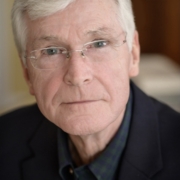
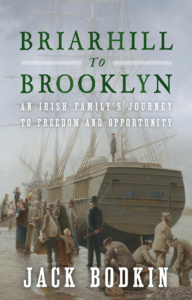
Jack Bodkin
Briarhill to Brooklyn
Ohio County Public Library
Tell us a little bit about yourself.
I was born in Brooklyn in 1947, and a couple of years later—like many other Brooklyn families—my parents, my older sister, and I moved to Long Island and into a new house in a post-World War II development in Merrick. Eventually, my sister and I welcomed a brother and three little sisters. Growing up in Merrick was great. I attended Catholic school, played Little League baseball, and delivered newspapers. Later, I washed the floors in the local luncheonette a couple of nights a week and went to high school dances, but before I knew it, I was an accounting major at a small college in Wheeling, West Virginia. After graduation, I started as a “Staff Accountant” in the thirteen-hundred-person office of an international CPA firm in New York City.
Eight years of insufferable commuting on the Long Island Rail Road and working long hours in Manhattan drove my wife and me back to West Virginia, where being a partner in a local CPA firm—and helping to raise our two children—consumed most of my life for the next thirty-five years. I enjoyed working as a CPA and saw more in my job than numbers. I wasn’t a tax person. My specialization was auditing financial statements, and I believed a company’s financial statement and its footnotes should tell a story—a detailed and complicated story. My job was to tell that story clearly and honestly. I guess that made me a storyteller.
In 2013, my title changed to “CPA Retired,” and what began as a project for my first winter in retirement—researching my family’s history in potato famine era Ireland—evolved from creating a family tree into collecting pictures and documents for a coffee table book. However, my attempts at the family tree and the coffee table book failed (or at least proved uninteresting to most members of my family), and I knew I had to move on. There were not enough documents, not enough pictures…simply not enough facts. I needed to fill in the blanks.
So, l began imagining and writing the story of my ancestors’ journey from Ireland to America. My objective was not to publish and try to sell a book. My original goal was simply to create a vehicle to document and preserve my family’s ancestral history for future generations of grandchildren, and the dedication page of Briarhill to Brooklyn: An Irish Family’s Journey to Freedom and Opportunity reads: “For my granddaughter, Sally…live, learn, and remember.”
Tell us a little bit about your winning book.
Briarhill to Brooklyn is a work of historical fiction in which I tell the story of my Irish Catholic family’s journey from County Galway, Ireland, on a coffin ship named Cushlamachree. The family—John and Eleanor Bodkin and seven of their children— began its journey on Saint Patrick’s Day 1848 in a townland called Briarhill. Their destination was Brooklyn.
Some of the book is fact, but most of the story is fiction, and the tale I tell in Briarhill to Brooklyn is what I have imagined about my Irish ancestors’ lives between 1848 and 1902. It is fiction sewn together with places, names, and dates I found in my research.
The prologue sets the stage for the immigrants’ story, using the retrospective voice of a first-person narrator. The narrator—one of the young siblings—describes the family crowding around the supper table in their Briarhill cottage. The young storyteller recalls his mother speaking in Irish to his father: “John, for the future of our children, we must go to America.” An unimaginable hurdle confronts the siblings only weeks after arriving in America, but they survive and assimilate into New York’s burgeoning and contentious melting pot.
The most significant event that transpired in the United States after the Bodkins arrived in New York was the Civil War, and two of the brothers enlisted in the Union Army as the war raged. While one brother bides two years of his time guarding the peaceful and bucolic City of New Orleans, the older of the two brothers becomes a fledgling surgeon on Alabama’s battlefields, where he learns the skills of a profession that will support the family into the twentieth century.
The tale I tell in Briarhill to Brooklyn is not quite rags to riches, but it is certainly the good news story of an immigrant family’s success.
What made you want to be an author?
I never planned to become an author, and I didn’t start the project that became Briarhill to Brooklyn with the intention of writing a novel—and I never really expected to sell any books. It all just happened, and now I find myself working on a prequel to Briarhill to Brooklyn.
How have libraries played a role in your indie author journey?
In the eighth grade—after my need for research material expanded beyond our family’s encyclopedia—I learned the Dewey decimal system and found a seat in the library.
Five decades after college, I made an author presentation to a “Lunch with Books” program offered by my local library at what proved to be the launch of Briarhill to Brooklyn. My audience was fifty people, mostly senior citizens—some had read my book, some had not. People who already read my story had questions about the characters and were curious to know what part of my story was fact versus what was fiction. Those who hadn’t read Briarhill to Brooklyn were interested in my writing routine and the self-publishing process. It was fun talking with them.
Since the “Lunch with Books” presentation, I have found that one of the most rewarding aspects of being an author is the opportunity to speak to library groups and book clubs. I’ve made book club presentations in a living room in North Carolina, a County Galway pub a few miles from Briarhill, and on a Zoom call with a group of American and British ex-pats living in Abu Dhabi. I’ve talked with library groups in Romney, West Virginia, and Pearl River, New York, where I’ve met many new friends. Library patrons and book club members are voracious readers, and it would be hard to imagine that most haven’t considered writing and self-publishing their own novels. So, we have a lot to talk about.
Libraries are the places authors want their books to be, and finding a waiting list for my book at my local library was exciting. But maybe a bigger thrill was seeing Briarhill to Brooklyn in the catalogues of the public libraries in Galway and Brooklyn!
Getting your book on a library shelf is challenging for a self-published author. Understandably, libraries have budget constraints, and there is a lot of competition for their collection acquisition dollars. The typical indie author does not have easy access to a mass advertising campaign led by a publishing house or a facilitated entryway to the distribution platforms used by libraries. Do-it-yourself ads in publications directed to libraries are expensive, and one-on-one emailing with libraries is hugely time-consuming and frustrating. But being an Indie Author Project 2023 Fiction Winner gives Briarhill to Brooklyn access to expanded marketing channels, and my emails now have a new opening line to get the attention of a library director.
Do you have any advice for aspiring indie authors?
Start.
Write what you are thinking. Don’t be afraid to make a mistake; no one is looking over your shoulder. You can, you will, and you should fix, move, cut, paste, rewrite, and rewrite. Enjoy the process and love what you create, but remember that your book won’t sell itself—you’ll have to market it.
Never give up!

